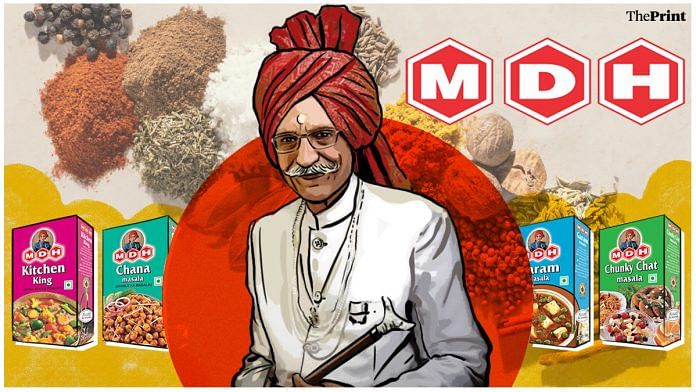New Delhi: In early April, reports of MDH—Mahashian Di Hatti Pvt Ltd—getting acquired by Hindustan Unilever Limited (HUL) sent the spice company’s stock plummeting by over 4 per cent.
MDH, pioneers of readymade masala in the Indian market and founded in 1919 by Mahashay Chunnilal Gulati in Sialkot (now in Pakistan), is a ‘start-up’ success story in an era when the word hadn’t even been coined in its current form.
MDH’s journey from Sialkot to a small shop in Delhi opened by a Partition immigrant to a conglomerate that manufactures more than 62 kinds of spices available in 150 packages has been nothing short of extraordinary. And almost everyone knows the face of the patriarch of the company – Dharampal Gulati, son of Chunnilal.
Reports of a takeover by FMCG maker HUL were rubbished by MDH executives. “No one thinks of selling their own child. The news is fake, baseless and frivolous,” Rajendra Kumar, executive vice-president of MDH, told ThePrint. On Twitter, the company told people “not to believe such rumours.” MDH is estimated to be valued between Rs 10,000 crore and Rs 15,000 crore.
Our brand name MDH stands for purity, quality and confidence of millions of consumers for more than over a century.#MDHspices #MDHmasale pic.twitter.com/LzlpeFKDqh
— MDH Spices Official (@SpicesMdh) March 23, 2022
A humble shop in Delhi’s Tilak Nagar
Mahashay Dharampal was the second of three sons of Chunnilal who owned a shop that ground spices in Sialkot. Post-partition, the family came to a refugee-camp in Amritsar, but on 27 September 1947, Dharampal decided to head for Delhi. There, he bought a horse carriage and ferried tourists to the capital. When that didn’t work, Dharampal started selling jaggery on Ajmal Khan road in Delhi, according to a booklet written on the life of MDH’s proprietor.
Although dates haven’t been specified, by early 1948, Dharampal had purchased a plot on Khajoor road, Krishna gali, to start an outlet for Indian spices, a business he understood well. In the meantime, he had already built a customer base at Ajmal Khan Road, selling Indian spices, pulse, oil, soap, and sugar among other things.
Dharampal, along with his father, Chunnilal, started buying natural spices to ground from Gadodiya Market, Katra Ishwar Bhawan, Katra Hussain Baksh and Tilak Nagar Market in Delhi. And thus started the empire.
Also read: MDH owner Mahashay Dharampal Gulati, the tongawala who turned crorepati, dies at 97
Pioneers of packed masala
At his shop in Delhi, Dharampal pioneered packaging processed spices to ensure doorstep delivery. He decided to give his product a distinct packaging and branding— this helped him gain the first-mover advantage in the market, and MDH was a start-up in its true sense.
By 1949, turmeric was being packaged as ‘paal di haldi‘ for sale in Delhi, followed by garam masala. Soon came Degi mirch — something Sialkot was popular for. The demand for packed masalas kept growing.
While Sialkot had a thriving market of ground spices, Delhi was sorely lacking. So, in a small wooden shop, Dharampal did everything — from grinding to packing to shipping. But the process was slow and laborious, because of this the company wanted to opt for mechanical grinding of spices.
In 1967, Dharampal purchased a plot in Delhi’s Kirti Nagar and established a small factory, scaling up his business. Today, MDH has large, fully automatic manufacturing plants in Delhi, Gurgaon, Nagaur and Sojat in Rajasthan. Branches have been set up at Ghaziabad in Uttar Pradesh and Amritsar and Ludhiana in Punjab.
Pioneering packaging of ground spices, scaling the business and establishing a trustworthy supply chain worked to Dharampal’s advantage and ensured his place as the king of the Indian masala market. Today, MDH is India’s second-biggest spice producer and seller after Everest Spices.
Also read: From vegicken curry to vegan mutton tikkas, mock meat players race to win Indian tastebuds
Successful advertising
If one says MDH, the first thing that often comes to mind is the jingle that played in its advertisements. That branding strategy made MDH a household name.
To expand out of the capital, Dharampal relied on advertising in newspapers. The first ad was taken out in Pratap newspaper on its front page. Here, the brand name was coined—’Mahashay Di Hatti of Sialkot Degi Mirch Waale’— and it stuck. And so, the Mahashay family started shipping its spices all over the country on an order-to-order basis, in 125 gm and 250 gm packets.
Much later, when MDH started advertising on television, Dharampal’s presence in the advertisements where he blesses newly wed couples and children, or dances made them a crowd-favourite and he came to be known as MDH’s ‘Dadaji’, arguably one of the most successful brand ambassadors in Indian ad history.
And the white-suited and red-turbaned Dharampal loved the attention.
“Main aur koi nasha nahi karta. Mujhe pyaar ka nasha hai,” he had told The Times of India, on being the world’s oldest ad star. ‘I am not addicted to anything else, but love.’
MDH masala’s “Asli masale sach sach, MDH, MDH” is one of those ad jingles that still play in most people’s heads. With a high recall value, the ads simply communicate the essence of the brand— purity of the spices.
Dharampal was conferred the Padma Bhushan in 2019 by President Ram Nath Kovind. He passed away on 3 December 2020 at 97. At the time for his death, his net worth was reportedly more than Rs 5,400 crore.
MDH has been taken over by his son, Rajiv Gulati, who has been credited for giving MDH international standing. The company now exports to the US, Canada, Europe, United Kingdom, South East Asia, Japan, UAE and has a manufacturing unit in Sharjah.
(Edited by Neera Majumdar)



